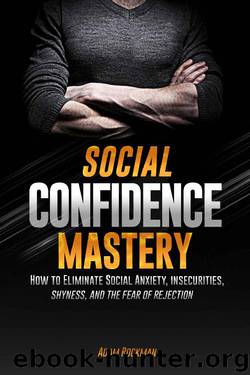Social Confidence Mastery: How to Eliminate Social Anxiety, Insecurities, Shyness, And The Fear of Rejection by Adam Rockman

Author:Adam Rockman [Rockman, Adam]
Language: eng
Format: epub
Published: 2017-03-27T07:00:00+00:00
Chapter 6: Accepting Anxious Feelings
“To venture causes anxiety, but not to venture is to lose one’s self… And to venture in the highest is to be conscious of one’s self.”
― Soren Kierkegaard
You may realize anxious feelings are illogical but these negative emotions still inhibit your behavior. You might want to start a conversation with a cute new coworker but you might feel a pain in your chest, you might blush, feel a general sense of dread as you seriously consider starting a conversation. To avoid this uncomfortable feeling you completely forget about getting to know your coworker and a few weeks later find out some other loser you work with is dating her.
Take a moment to think about your own experience of wanting to interact with another person but then deciding not to because the pain of anxiety was too strong. Does this really make sense? It’s a little funny if you think about it. You know the words you wanted to say but they just wouldn’t come out. You had the capacity to socialize but some negative feeling made you scared of something that came with zero risk at all.
In his book The Flinch, Julien Smith uses this common fear response as a metaphor for all anxieties. He writes, “Behind every act you’re unable to do, fear of the flinch is there, like a puppet master, steering you off course. Facing the flinch is hard. It means seeing the lies you tell yourself, facing the fear behind them, and handling the pain that your journey demands—all without hesitation. The flinch is the moment every doubt you’ve ever had comes back and hits you, hard. It’s when your body feels tense. It’s an instinct that tells you to run. It’s a moment of tension that happens in the body and the brain, and it stops everything cold.”
Smith rightly explains that even though “the flinch” exists to protect you, it’s necessary to handle this emotional response or you could fall prey to outside forces. The flinch is the anticipation of pain that might not even exist. It’s the uncomfortable anticipation you might feel before entering cold water. Before you are about to step in you will feel the resistance. Assuming you aren’t already used to cold showers of course. But if you step into the water, after a few moments you can get used to it.
Cold showers actually have a lot of health benefits, and increase awareness. Even though you anticipated discomfort, it would likely feel good afterwards. The only reason you dreaded going into the cold water was because you weren’t used to it. There weren’t even any negative consequences.
It will be the same with most social interactions that cause you anxiety. When you accept your emotional reactions you can train yourself to react with more congruence to what is important to you.
We have been discussing acceptance and by now you see the value of accepting parts of your identity you have suppressed.
Working on this has helped many people relieve intense anxieties.
Download
This site does not store any files on its server. We only index and link to content provided by other sites. Please contact the content providers to delete copyright contents if any and email us, we'll remove relevant links or contents immediately.
Rewire Your Anxious Brain by Catherine M. Pittman(18656)
The Code Book by Simon Singh(3189)
The Wrong McElroy by KL Hughes(2488)
How to Be Yourself by Ellen Hendriksen(2424)
No Worries by Sarah Edelman(2253)
Anxious for Nothing by Max Lucado(1976)
Life After Darkness by Michelle Knight(1970)
The Velvet Rage by Alan Downs(1885)
I Really Didn't Think This Through by Beth Evans(1795)
Unfuck Your Brain: Using Science to Get Over Anxiety, Depression, Anger, Freak-Outs, and Triggers by Faith G Harper(1764)
The Anxiety Workbook by Arlin Cuncic MA(1698)
First, We Make the Beast Beautiful by Sarah Wilson(1666)
Free Yourself from Fears by Joseph O'Connor(1651)
How Not to Worry by Paul McGee(1620)
You Can Do All Things by Kate Allan(1602)
The Worry Trick by David A Carbonell(1521)
Coping with Anxiety by Edmund Bourne & Lorna Garano(1510)
Need by Unknown(1471)
The Sensory Child Gets Organized by Carolyn Dalgliesh(1448)
